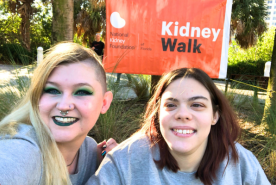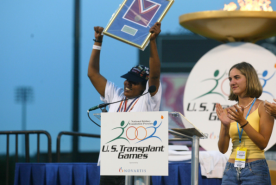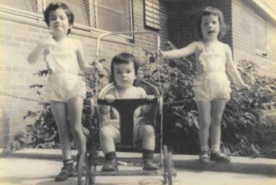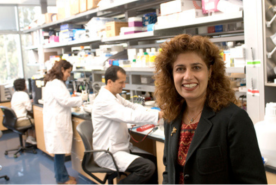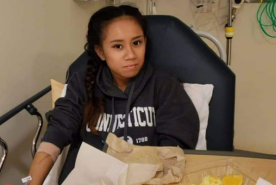Last Updated: April 18, 2025
Medically reviewed by NKF Patient Education Team
Table of Contents
How to Get Tested for Kidney Donation
After you’ve made the decision to get evaluated as a potential living donor, you’ll need to contact a transplant center to begin the kidney donor process. If you want to donate your kidney to someone that you know (directed donor), you’ll have to contact the transplant center where they're waitlisted at to get evaluated. If you’re a non-directed donor, or want to donate to someone that you don’t know, then you can contact any transplant center to start your evaluation process.
After you have decided which transplant center you would like to get evaluated at, you will complete a Health History form for that specific transplant center, which includes questions about your medical and social history. You can find these forms on the hospital’s website. Once you have submitted the form (sent the form back to the center), the living donor team will contact you to schedule a time that’s good for you to come in for the living donor evaluation.
Before the Evaluation
Before scheduling your evaluation and meeting with the living donor team, you will be asked to give a blood and urine sample, either at the transplant center or a lab near you. This will help the team make sure that you don’t have any obvious health issues that would stop you from moving forward before bringing you in for evaluation.
Since most living donor evaluations are about two days long, the team might suggest you stay overnight near the transplant center, depending on how far away you live. Your transplant team will talk to you about traveling when they schedule you for evaluation. In most cases, the transplant center will offer discounted options for hotels or other lodging. There are also financial programs to help living donors and recipients cover the costs of travel, meals, etc. during the evaluation and other steps of the living donor process.
Living Donor Evaluation
Most transplant centers have a similar living donor evaluation. During the evaluation, you’ll meet with the living donor team and have many tests done, including lab work (from your blood) and imaging (such as CT scans, etc.).
The Living Donor Team
During your evaluation, you will meet with the living donor team that is there to help figure out if you are in good enough health to donate and make sure you have all the information you need to make a decision. This will include:
- Nurse Coordinator
- The nurse coordinator will be your point person throughout your entire evaluation, surgery and into follow-up after surgery. They’ll be able to help answer your medical questions, review your lab results and will let you know where you’re at in the process.
- Nephrologist
- You’ll meet with the transplant nephrologist, also known as a kidney doctor. They’ll talk to you about how well your kidneys are working, more specifically if you’re healthy enough to donate a kidney. They might ask you some other questions if they see anything concerning with your lab work or just ask questions to make sure you’re healthy enough to donate.
- Social Worker
- Everyone meets with a social worker during the evaluation process. They’ll talk to you about your ability to take time off of work, ask you who your caregivers will be for your hospital stay after surgery and recovery, and make sure your emotional well-being won’t be negatively affected by donating. They’ll also check to see if you qualify for any financial resources, such a help with gas, hotel if needed, and meals for both you and your caregiver, during the entire process. You can also expect to see them when you’re recovering from surgery, too.
- Surgeon
- The surgeon will ask you about any surgeries that you’ve had in the past, explain how the living donor surgery will take place, which is usually through tiny incisions in the belly area, and talk about pain management (pain medicine) immediately following surgery. You’ll also see them a couple of times while you’re in the hospital.
- Dietitian
- You’ll meet with a dietitian during your evaluation. They’ll review your daily eating habits and even though living donors don’t have to change their diet after donating, they’ll review what a healthy, well-balanced diet looks like, to make sure you’re taking proper care of your body before and after donating.
- Independent Living Donor Advocate
- An Independent Living Donor Advocate (also known as an ILDA) is a care team member who is separate from the living donor team and will meet with you during your evaluation to understand your reasons for wanting to donate and to make sure that no one is pressuring you in any way. The ILDA will be able to talk to you at any step of the process as well, including while you're in the hospital after surgery. The ILDA can be a spiritual or religious figure at a hospital, such as a chaplain, or it may be a social worker or nurse from a different department.
Medical Tests
Though each transplant center’s evaluation may be a little different, they will all include at least some imaging and blood work:
- Imaging
- Imaging tests are done to take pictures of the inside of your body. For a living donor, doctors will have you do a chest X-ray, CT scan and kidney scan. These will help the surgeon and nephrologist to see where your kidneys are located, the size of your kidneys and how well the blood flows to and from both of your kidneys. This also helps them to decide which kidney is the best for you to donate, leaving you with the healthier kidney.
- Lab work
- Even though you will have had blood work done and gave a urine sample before coming for evaluation, the team will have you do another blood draw and urine sample at evaluation just to make sure you’re still healthy enough to keep moving forward through the process. They may also want to do some extra tests that were not done before.
After your evaluation, you may need other tests or imaging done to help the team decide if you’re healthy enough to donate. All medical expenses related to donating will be covered by the recipient’s health insurance, even if you’re donating to someone you don’t know.
Medical Costs Not Covered by Recipient’s Health Insurance
A big question that many people ask is “who pays if you donate a kidney?” All medical expenses directly related to becoming a living donor are covered by the recipient’s health insurance. This includes the evaluation with the living donor team, blood work, imaging, surgery, hospital stay after surgery, and follow up appointments. However, if you are missing any normal appointments or tests that are considered “routine healthcare”, like annual visits to the dentist and OBGYN visits for women donors, those are not covered. This is because these appointments are not related to the donation process and every person, whether they want to become a living donor or not, should be keeping up with their healthcare. What you may need to cover could include but is not limited to:
- Colonoscopies (for donors over the age of 50)
- Mammograms (for female donors over the age of 40)
- Annual visits to OBGYN for all female donors
- Dental Exams
Not all transplant centers require donors to have their own health insurance to be approved to donate, so if you don’t have your own, the living donor social worker can help to find free or low-cost clinics near where you live.
Time it Takes to Get Approved to Donate
How long the kidney donor testing takes depends on a couple of things, including the time from when you apply to become a living donor to when you’re approved and scheduled for surgery. The sooner you’re able to go in for the evaluation and get other tests done that the living donor team requests, the sooner the team will have everything they need to make a decision about whether you are healthy enough to donate. Some potential donors have busy schedules or might not easily be able to take time off from work, which can make the process a little longer.
The transplant center may only have certain days of the week where they do living donor evaluations, or might have a large number of donors going through evaluation at one time, which can add to the length of the process. Usually, the process takes from a few months to up to a year. Ask your living donor team where you’re getting evaluated at for more information about how long it usually takes at their center.
If you are approved to donate
After you’re evaluated as a living donor and have completed all of the tests that the team has requested, they will call you to let you know if you’ve been approved to donate at their center. The transplant team will first let you know that you’ve been approved and talk to you about moving forward before they let your recipient know that there is an approved donor for them.
The living donor team will talk to you and your recipient about scheduling a time that works for both of you to come in for surgery.
If you are not approved to donate
There could be many reasons why you may not be approved to donate, including having a current medical condition that could potentially worsen after donating. The job of the living donor team is to make sure that all people who donate will have the best chance at living a normal, healthy life after donation.
If for any reason you’re not approved to donate at one transplant center, you are able to get evaluated at other transplant centers. If you decide to contact another transplant center, there isn’t a guarantee that they will approve you to donate. You can talk to the new transplant team for more information.
Some of your tests, like imaging, can be sent to other centers so you won’t have to repeat everything. However, you will still need to meet with the members of each living donor team at every center you’re evaluated at. If you’re trying to donate to someone that you know, you will have to get evaluated and approved at the centers where they’re on the waitlist.
Questions for the Healthcare Team
- How long does it take to get evaluated at your center? What can I do to make this go as smoothly as possible?
- Does your center do paired exchange if I am not a match with the person I want to donate to?
- What kinds of help can I get to cover the other costs of being a donor, such as extra medical tests, travel and hotel, unpaid time off work, etc.?
More resources
- Talk to someone who’s donated (NKF Peers) (Spanish Peers)
- Ask questions and get help finding a transplant center (NKF CARES)

